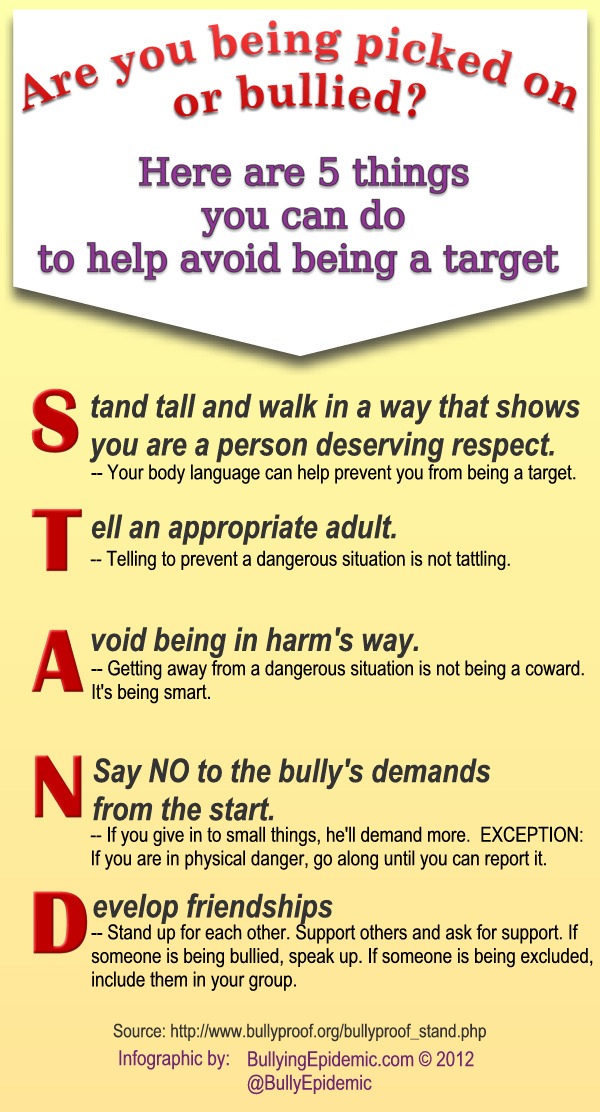Speech Buddies Parents’ Corner – 8 Tips For Protecting Your Kids Against Bullying
Image Courtesy of www.adlibbing.orgThe start of each school year brings some of the same things year after year – new backpacks, gym shoes, and friendships. However, it can also mean the return of the school bully. While some people might argue that bullying in school is as old as school itself and a rite of passage, studies show that for the victims of school bullying the effects can be devastating.
1. Don’t Believe Bullying Is A Normal Part of Childhood
If you tend to shrug off bullying in school as typical social behavior that some kids just have to endure, it’s time to take a closer look. Organizations such as the National Education Association and national Institute of Child Health have reported statistics and warnings about the effects of school bullying.
- Approximately 15% of kids who miss school do so because they are afraid of being bullied.
- As many as 1 in 10 students drop out of school or changes schools after being repeatedly bullied.
- As many as 40% of boys who are determined to be “bullies” in grades 6th-9th are arrested 3 or more times by the time they are 30 years old.
- Victims of school bullying have increased chances of depression and substance abuse.
- More than 70% of kids believe that school bullying is a consistent problem – probably because every 7 minutes a child is bullied on the playground.
Just because bullying in school happens with even greater intensity now does not mean that families have to accept it as the norm.
Image Courtesy of visual.ly2. Talk with Your Kids about Bullying in School
Let your child know that you understand that it is a problem that too many children face and that you are available, supportive, and willing to listen (without exploding in reaction). If you watch TV shows or read together and bullying is a topic, use that to further the discussions.
3. Know the School’s Bullying Policy
When your child comes home with anxiety and tears because of bullying the last thing you want to have to deal with is shuffling through paperwork and protocols trying to see what your role as a parent is in the matter. Schools often have reporting guidelines and consequences already outlined – understanding these ahead of time can let you quickly help your child.
4. Learn About the Symptoms of Bullying
Kids who are victims of bullying often exhibit certain signs and behaviors that parents might not initially associate with bullying.
- Complains about going to school, the teachers, or the environment overall on a regular basis
- Shows signs of academic decline – falling grades, missing homework, etc.
- Seems to pull back from friendships and social activities, especially school-related
- Comes home with scratches, bruises, or damaged clothing and books
- Isn’t sleeping well
- Is irritable, easily frustrated, and emotional

Courtesy bullyingepidemic.com
5. Know If Your Child is At Risk of Being Bullied
Anyone can become a victim of school bullying, but there seem to be certain kids who are more likely to be tormented and targeted. Kids who might be at increased risk of bullying in school:
- Have an outward difference (over/under weight, wears different clothing, etc.)
- Struggle with health, speech, or behaviors conditions (illness, Autism, stuttering, tics, etc.)
- Have low self-esteem
- Seem to not have very many close friends
- Struggle with regulating emotions (have outbursts, show anger easily, easily provoked, etc.)
6. Get to Know Your Kid’s Friends
You might be surprised what you can learn about your child through the eyes of another child. Get to know your child’s friends and pay attention to the social interactions your child has. If your child does struggle with bullying in school you can encourage relationships that have a history of being positive for your child.
7. Maintain Your Cool
No tween or teenager wants to be known as a tattletale, so if your child does confide in you that there is bullying, carefully consider an appropriate response that will keep your child safe and put an end to the behaviors. Taking the behaviors to the other parents while you’re still fuming with frustration can sometimes only lead to more frustrations.
8. Help Find a Hobby
Make sure your child has opportunities for activities outside of school with a new social set. Hobbies, classes, clubs, and other organizations can help give your child positive experiences and build confidence.
Some children suffer so greatly that professional counseling is warranted. Parenting is hard work, and surviving bullying in school can be even harder. Be your child’s supporter and buffer as you help him or her navigate the hallways of adolescence.


